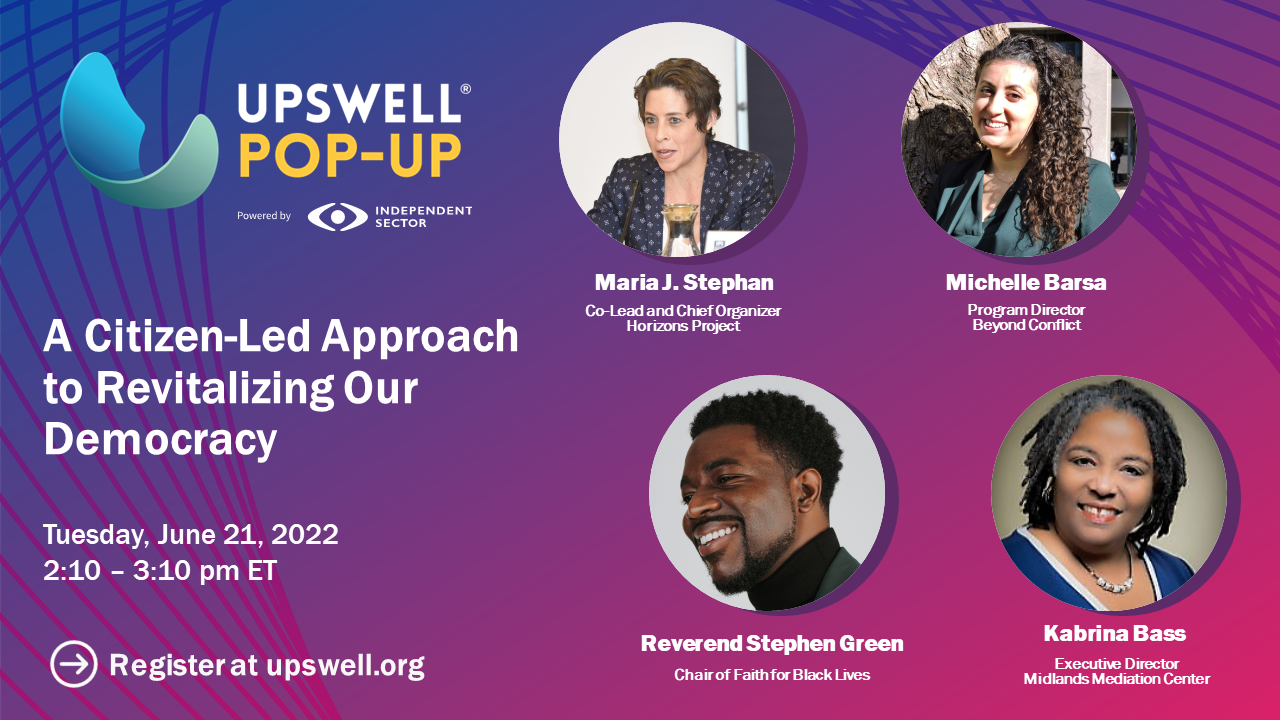
- This event has passed.
A Citizen-Led Approach to Revitalizing Democracy
June 21, 2022 @ 2:10 pm - 3:10 pm

This was part of Upswell’s Bridging Toward Belonging pop-up summit on June 21 from 2:10-3:10 pm ET!
Watch the recording for this event and access the slide deck and resources here.
At a time when authoritarianism is on the rise globally, democracy experts have been sounding the alarm bells for the global community to act and prevent further democratic decline. Renewed efforts to ensure free and fair elections, invest in civic education, and address issues of inequality and justice are underway in the U.S. and around the world. Yet, many recommendations target governments and political party infrastructure and offer less detail for how civil society can organize for democracy here at home in the United States. With so much at stake, we need an all-hands-on-deck approach.
To think about what this approach can look like, we must first understand the factors that are contributing to a degradation in democracy and adherence to democratic norms. Much emphasis is placed on addressing increasingly toxic levels of political polarization in the U.S. and around the world. However, more needs to be done to understand what is driving this polarization, including social identity threat and how perceived threats to one’s “in-group” can lead to decreased tolerance and willingness to support diverse viewpoints, not only of another group, but also within one’s own community.
This panel will explore two themes. The first theme will focus on the latest research to understand the psycho-social underpinnings of democracy and what makes individuals more likely to engage in undemocratic practice. Panelists will explore how authoritarianism is a system made up of different pillars of support (including government institutions, political parties, media outlets, and business groups, among others) and how broad-based movements have combatted authoritarianism in the past in the U.S. and abroad. Panelists will also discuss what these findings mean for how social justice activists, bridge- and peace builders, and democracy practitioners can better organize and orient themselves to do their work in a way that increases opportunities to build relationships with diverse stakeholders and foster social cohesion. The panel will then pivot to hear from U.S. social justice, bridgebuilding, peacebuilding and democracy practitioners as they share the trends they are seeing in their respective communities and reflect upon how this research can inform their work to build a more just, inclusive, and multi-plural democracy.
Panelists:
- Maria J. Stephan, Horizons Project (moderator)
- Michelle Barsa, Beyond Conflict (panelist)
- Reverend Stephen Green, Faith for Black Lives (panelist)
- Kabrina Bass, Midlands Mediation Center (panelist)
Session Takeaways:
Participants will leave this session with a better understanding and appreciation for how social justice, democracy, bridge, and peacebuilding practitioners can work together to address injustice and inequity while ensuring they are creating a community and democracy in which everyone can feel they belong. They will also hear practical examples of how activists, organizers, and bridgebuilders are strategically using power-shifting and relationship-building approaches together to achieve their short- and long-term goals, and discuss what this means for their own work in their respective sectors (including nonprofit, private, and government) and communities.
